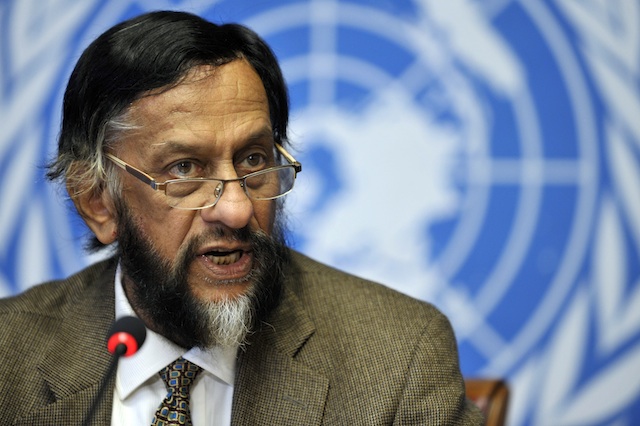SUMMARY
This is AI generated summarization, which may have errors. For context, always refer to the full article.

PARIS, France – Scientists will hike pressure next week on the UN’s troubled climate talks as they release a report pointing to the dizzying challenge of meeting the international body’s target for global warming.
In the first volume of a massive trilogy, the Nobel-winning Intergovernmental Panel on Climate Change (IPCC) will publish its projections for warming by 2100.
Just a single scenario — and by far the toughest to achieve — sees the possibility of safely anchoring the temperature rise to within two degrees Celsius (3.6 degrees Fahrenheit), according to a draft seen by AFP.
In the other projections, the UN’s much-trumpeted 2 C goal will be overshot.
At the very top of the range, warming would be more than double the UN target and more than triple that set by vulnerable small-island states.
Warming on this scale would gravely accentuate the peril from drought, flood, storms and rising seas.
“It’s been known for a long time that we are running out of time,” said Alden Meyer, with the US environmental group the Union of Concerned Scientists (UCS).
“The longer you wait, the more difficult it becomes and the more expensive it gets.”
The Philippines and #ProjectAgos
In Manila, which ranks second among cities most vulnerable to the disastrous effects of climate change, Filipinos attempt to mitigate these effects through technology and social media – the “power of the many.”
READ: Social Media in disasters: Info as important as food, shelter
It was the highlight of the PH+Social Good: The 2013 Manila Social Good Summit held on Saturday, September 21.
#ProjectAgos, an initiative by Rappler, was introduced during the event. It brings together government, the private sector and citizens to tackle climate change adaptation and disaster risk reduction
Four projections
The UN’s panel of climate scientists has issued only 4 overviews in 25 years. The last was in 2007 and despite fierce opposition from skeptics, climate science has made many advances since then.
The work released in Stockholm on Friday comprises a 2,000-page report authored by 257 scientists, plus a 31-page Summary for Policymakers.
Over the 4 preceding days, the summary will be vetted line by line by government representatives from 195 countries. Governments have a seat on the panel but are not allowed to censor the scientists’ main report.
The draft document strengthens the IPCC’s conviction in 2007 — from 90 to 95 percent — that humans are to blame for climate change.
It also sees 4 projections based on “radiative forcing,” or the heat delivered to Earth’s surface as a result of fossil-fuel gases and other carbon emissions that trap solar heat.
The lowest scenario sees an average temperature rise of 1.0 C (1.8 F) by 2100, ranging from 0.3 to 1.7 C (0.5-3.1 F).
The highest scenario has an average of 3.7 C (6.7 F), ranging from 2.6 C (4.7 F) to a whopping 4.8 C (8.6 F).
But around 0.8 C (1.4 F) must be added to all these figures to factor in warming since the start of the Industrial Revolution — the yardstick used in the UN target.
Previous research into the lowest scenario says global carbon dioxide (CO2) emissions, currently scaling new highs, must peak by around 2020 and then decline sharply.
By the end of the century, emissions would even have to be negative compared with 2000, say some models.
In other words, some CO2 would have to be stripped out of the atmosphere to help the cooling — something that has no precedent in recent human history.
True to tradition, the IPCC is mute on recommendations and what could be considered a safe maximum, although it cautions that reaching 2C will require “substantially lower” emissions.
Small island states that fear being drowned by rising seas are clamoring for an even more stringent target, of 1.5 C (2.7 F).
Climate‘s rise and fall as political issue
The IPCC co-won the Nobel Peace Prize after publishing its landmark Fourth Assessment Report, or AR4, in 2007.
After that, climate change as an issue went into decline after the near-fiasco of the 2009 Copenhagen Summit. And the IPCC’s own reputation was dented by several mistakes that emerged in AR4.
Together, this enabled climate skeptics to assault the point of curbing greenhouse gases, especially as the world financial crisis began to grip rich economies.
Environmentalists, though, say climate change is a fact that cannot be ducked, and the IPCC is essential for addressing it as its work carries the imprimatur of governments.
“The IPCC is the foundation stone on which the whole of the climate movement is built and on which the whole of climate policy is founded,” said Tim Nuthall of the European Climate Foundation.
“It will become the new playbook, just as AR4 did over time… if you take a step back, the report over the next few years will permeate down to so many sections of the economy and society.”
Dealing with the greenhouse effect is a political nightmare, touching on high costs and powerful interests.
It entails weaning today’s economies off their dependence on coal, oil and gas, the bedrock of their energy supply.
Efforts for a UN pact stumbled in Copenhagen in 2009. The next deadline is for 2015 — and even this is beginning to look shaky.
“Greenhouse gases are altering Earth’s climate. No serious politician on the planet can now dispute that,” the science journal Nature said in an editorial on Wednesday.
But it added: “The governments of the world, to whom the IPCC reports, have made precious little headway in reducing emissions. And they appear in little hurry to do so.” – with reports from Michael Bueza/Rappler.com
Add a comment
How does this make you feel?
There are no comments yet. Add your comment to start the conversation.